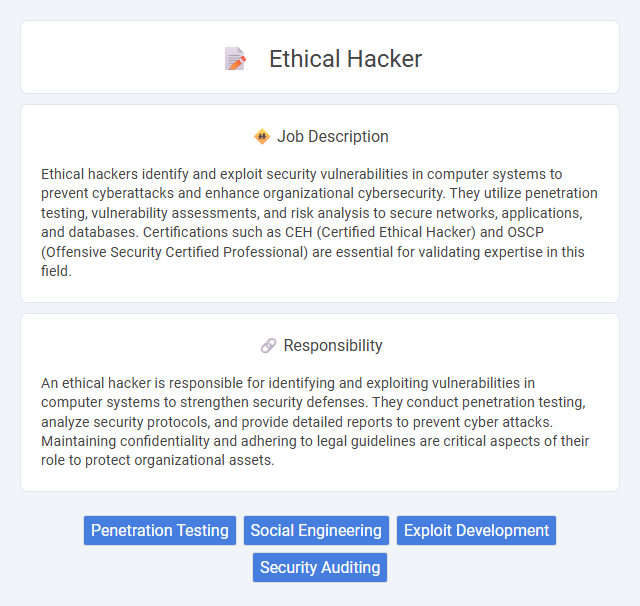
Ethical hackers identify and exploit security vulnerabilities in computer systems to prevent cyberattacks and enhance organizational cybersecurity. They utilize penetration testing, vulnerability assessments, and risk analysis to secure networks, applications, and databases. Certifications such as CEH (Certified Ethical Hacker) and OSCP (Offensive Security Certified Professional) are essential for validating expertise in this field.
Individuals with strong analytical skills and a passion for cybersecurity are likely to thrive as ethical hackers. Those who are detail-oriented, persistent, and comfortable with problem-solving in high-pressure situations may find this role particularly suitable. People who prefer structured environments or lack interest in continuous learning about evolving cyber threats might face challenges in this career.
Qualification
Ethical hackers typically require certifications such as Certified Ethical Hacker (CEH), Offensive Security Certified Professional (OSCP), or CompTIA Security+ to demonstrate expertise in penetration testing and cybersecurity principles. A strong foundation in computer science, network protocols, and programming languages like Python or Java is essential for identifying vulnerabilities and securing systems. Practical experience with tools like Metasploit, Wireshark, and Nmap enhances an ethical hacker's ability to simulate cyberattacks and improve organizational security.
Responsibility
An ethical hacker is responsible for identifying and exploiting vulnerabilities in computer systems to strengthen security defenses. They conduct penetration testing, analyze security protocols, and provide detailed reports to prevent cyber attacks. Maintaining confidentiality and adhering to legal guidelines are critical aspects of their role to protect organizational assets.
Benefit
An ethical hacker job probably provides significant benefits such as helping organizations identify and fix security vulnerabilities before malicious hackers exploit them. This role likely offers opportunities for continuous learning and skill development in cybersecurity. The demand for ethical hackers is expected to grow, possibly leading to strong job security and attractive compensation.
Challenge
The role of an ethical hacker likely involves constant challenges due to the ever-evolving nature of cybersecurity threats. Professionals in this field probably face complex scenarios requiring advanced problem-solving skills and creativity to identify vulnerabilities before malicious hackers do. The continuous need to stay updated with the latest hacking techniques and security protocols may contribute to the job's demanding and intellectually stimulating environment.
Career Advancement
Ethical hackers improve their career prospects by obtaining certifications such as CEH (Certified Ethical Hacker) and OSCP (Offensive Security Certified Professional), which validate their skills in penetration testing and vulnerability assessment. Gaining experience in industries like finance, healthcare, and technology enhances their expertise in tackling sector-specific cyber threats, increasing employability and salary potential. Advanced roles include cybersecurity analyst, penetration tester, and security consultant, offering opportunities to lead security teams and develop comprehensive defense strategies.
Key Terms
Penetration Testing
Ethical hackers specialize in penetration testing to identify vulnerabilities in computer systems and networks before malicious actors can exploit them. They use advanced tools and techniques to simulate cyberattacks, assess security weaknesses, and provide actionable recommendations to strengthen defenses. Mastery of programming languages, network protocols, and cybersecurity frameworks is essential for effective penetration testing in ethical hacking.
Social Engineering
Ethical hackers specializing in social engineering exploit human psychology to identify security vulnerabilities within organizations. They conduct simulated phishing attacks, pretexting, and baiting to test employee awareness and improve cybersecurity training programs. Their work helps prevent data breaches by strengthening the human element of information security defenses.
Exploit Development
Ethical hacker roles specializing in exploit development focus on identifying and creating proof-of-concept code to test system vulnerabilities and improve cybersecurity defenses. Mastery in programming languages such as Python, C, and assembly is essential for crafting exploits that simulate real-world attack scenarios. Proficiency in reverse engineering, memory corruption techniques, and penetration testing frameworks like Metasploit enhances the effectiveness of vulnerability assessments and intrusion prevention.
Security Auditing
Ethical hackers specialize in security auditing by systematically evaluating computer systems and networks to identify vulnerabilities before malicious actors can exploit them. They employ advanced penetration testing techniques, vulnerability scanning tools, and security protocols to ensure robust defense mechanisms are in place. This proactive approach is crucial for organizations to maintain data integrity, compliance with cybersecurity regulations, and overall risk management.
 kuljobs.com
kuljobs.com